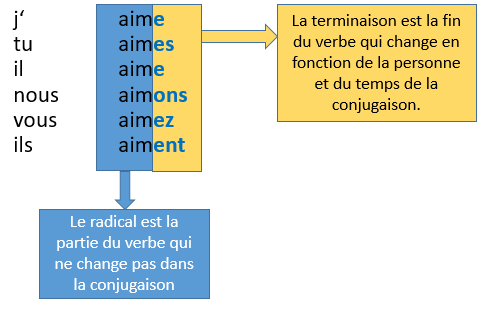Radical and ending
The radical is the smallest part of a verb. It does not change in the conjugation of the verb. In contrast, in conjugation, the end of a conjugated verb is the ending. The ending changes according to the tense or the person of the verb whereas the radical does not change.
For a verb of the first group like "chanter" (to sing), one finds the radical by removing the ending -er. The radical is therefore "chant-" and the ending "-er".
For the verbs of the 2nd group, we proceed in the same way and we remove the finale ending -ir. Example: "finir" has radical "fin-" and ending "-ir".
For the verbs of the 3rd group, it is more complicated, the radical can change depending on the conjugation. The worst is the verb "aller" since it has several radicals in its conjugation: "all-" (nous allons), "v-" (je vais), ir- (nous irons). In this case, you have to learn them by heart.
A conjugated verb is always formed on this principle : radical + ending = conjugated form.
- The radical is the first part of the verb that does not change in its conjugation.
- Termination is the variable part of a verb that takes the mark of the person and time.
